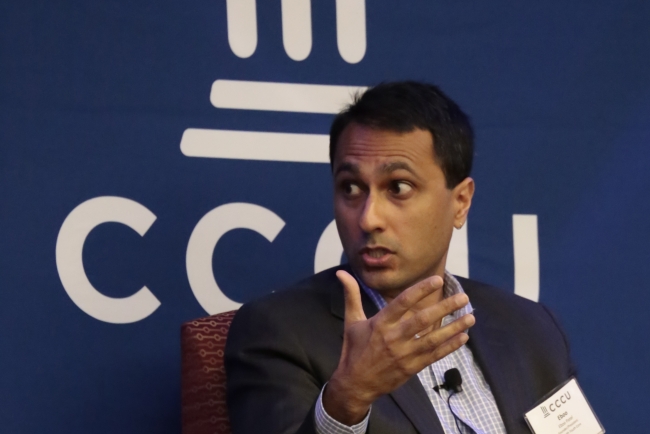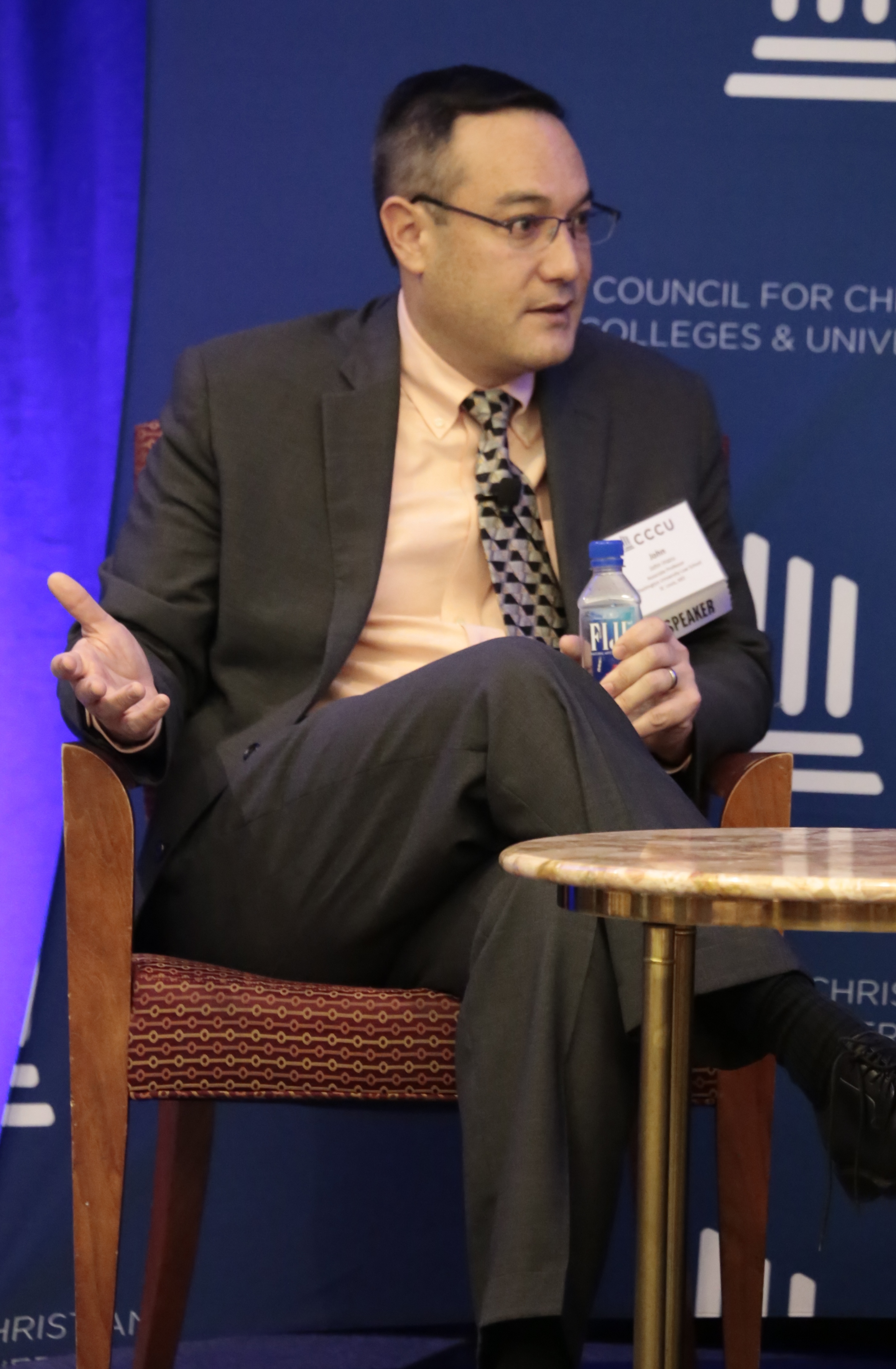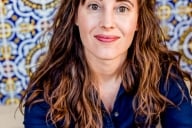You have /5 articles left.
Sign up for a free account or log in.

Eboo Patel
Photos by Warren Pettit
WASHINGTON -- As John Inazu and Eboo Patel spoke to a group of Christian college presidents Friday about the speakers' conceptions of "confident pluralism," "modest unity" and "common ground," it was hard not to wish their words about the importance of respectful difference could be blared on loudspeakers around this capital city (and anywhere else people might seem not to be tolerating differences very well) at this moment in our cultural and political arc.
Wishful thinking, of course. Inazu's and Patel's more modest charge was to talk with 100 or so members of the Council for Christian Colleges and Universities about why their institutions should not only care about but might actually showcase modern pluralism and the ability to build relationships across differences.
The subject is not an academic one for the association's members. While many of the campuses require students and employees to hew to Christian ideology, and hence feature little to no religious or cultural diversity, some of them are seeing significant growth in enrollments of Muslim students, among others.
And like many traditional institutions in an era of turbulent societal change, Christian colleges have endured conflicts over religious freedom (witness Wheaton College of Illinois, which in 2016 moved to fire a professor for wearing a hijab during Advent as a show of solidarity with Muslims and for explaining her action by saying Christians and Muslims worship a common God) and sexual orientation (with some colleges leaving the group in 2015 amid a rift over policies regarding gay professors). Even those colleges that might avert conflict on their own campuses cannot look inward if they want to be engaged in a broader world that is increasingly multicultural, said Shirley Hoogstra, the association's president. (Note: This paragraph has been updated from an earlier version to clarify Wheaton's actions regarding the head-scarf-wearing professor.)
"There may have been a time 25 years ago where you didn’t have to necessarily be cognizant of the religious liberties of others if you were a white Christian," Hoogstra said. "But in today's world, if Protestant Christians like us are going to ask for religious liberties, it's going to require us also to be vigilant about religious freedom for Muslims and Hindus and others, too."
To its credit, the Christian college group is not ducking these and other controversial issues; the agenda for last week's meeting also featured sessions on how to deal with same-sex marriage and the continuing racial turmoil on college campuses, although from a decidedly Christian standpoint.
The conflicts at Wheaton and elsewhere remained obscurely in the background during the session featuring Inazu, the Sally D. Danforth Distinguished Professor of Law and Religion at Washington University in St. Louis, and Patel, founder and president of the Interfaith Youth Core, which aims to foster religious tolerance on campuses.
The focus was instead on the importance of cooperation despite differences and the role of higher education generally, and the CCCU's Christian (mainly Protestant) campuses in particular, in showing the rest of the country how it's done.
Patel, an Indian Muslim who has dedicated his career to encouraging interfaith cooperation on campuses, took an intensely personal approach to the discussion.
He began with stories of two evangelical students whose co- or extracurricular activities forced them into unexpected encounters with the religious "other" -- one who was unsure whether his religion would permit him to be "spiritually adopted" (in the form of receiving a Native American name) by an elderly Navajo woman on a service mission, and another whose offhand acceptance of an invitation to attend a candlelight vigil to support a torched mosque alienated members of her Christian student group.
"I promise you your students, in some way, shape or form, are having these types of encounters," Patel told the Christian college presidents. They may have been able to live in a bubble before, he said, but "no cave … is far enough away and closed enough off from other people" that they can do so today.
Being forced to confront the "other" may be difficult, but ultimately it is usually affirming, he said. "If the only people you meet or know are other people like you, you experience your identity as fate," Patel said. "But when you encounter and consider other views, and through dialogue and even disagreement affirm your perspective, you begin to experience your identity as choice."
Patel admitted to having a personal as well as professional stake in the question. "I really hope the only thing your students know about 1.6 billion Muslims, including two screwy kids in Chicago named Zayd and Khalil, my sons, is not just what they know from their Facebook news feed," he said. "They need to know other things than Islamic terrorism."
"And I have a stake in you all remaining deeply rooted Christians who are excellent neighbors in creating a civil society where I can be a Muslim and proud, and free, and safe, and American."
‘Confident Pluralism’
Inazu framed his remarks around his 2016 book Confident Pluralism (University of Chicago Press), whose subtitle ("Surviving and Thriving Through Deep Difference") reveals a surprising optimism at a time when the country often seems to be Clashing and Crashing Amid Irreconcilable Differences.
As Inazu tells it, though, the current turmoil is neither original nor unexpected. "This is not the first time we've confronted racial tensions, divergent views of morality, religious differences or coarse rhetoric," he argued, and the "success of the American political experiment," such as it is, has "always required finding modest unity against great odds."
He attributes much of today's social tumult to what the Roman Catholic writer Joseph Bottum described as the "great explanatory event from which follows nearly everything in our social and political history": the crumbling a half century ago of the mainline Protestant churches, which had shaped (for better or worse) the social identity and morality of the majority of Americans. That collapse resulted in loss (of coherence for many white Christian Americans) but also gain, in a broadening and enriching of American culture, Inazu argued -- and while some might yearn for a return to the past, "that is not only impractical, it is often offensive," he said.
"Going back to 1950s is not a good bargain for African-Americans," nor is going back to the 1940s good for Japanese-Americans, like his ancestors, Inazu said. "The past is not a good bet if your race, gender, religion or sexuality placed you at the margins of the political consensus that ruled those times."
Instead, we must go forward, he said, and "confident pluralism" presents a path to doing so. (Inazu took the phrase from a 2010 Supreme Court case in which a libertarian gay rights organization filed a brief backing the right of a group of Christian law students at public universities to discriminate against gay people in choosing its leaders.)
As he defines it, confident pluralism is not about what he termed the "elusive goal" of unity, in which fundamental differences among groups could be overcome and agreement reached. "Confident pluralism suggests the more modest possibility that we can live together in our manyness," Inazu said. "The vision doesn't entail illusions that our differences disappear; instead, it forces us to pursue common existence in spite of our many differences."
Confident pluralism assumes that mainstream groups "are confident [enough] in the beliefs and … institutions that sustain them" that they can afford to recognize and respect the beliefs and arguments of "other" groups, even if they disagree with them.
This recognition must be pursued through both legal and civic channels, Inazu said. The rights of all groups to associate must be constitutionally protected so they have spaces to form ideas and create a sense of community and belonging, and public forums and funding assured without regard to viewpoint or ideology. "We need to insist that the people we entrust to govern us honor basic constitutional principles to protect differences," Inazu said. (He acknowledges that sometimes creating space for one group to associate freely imposes costs on others; in other settings, he has argued that student groups at public institutions should be able to bar would-be members whose views, identity or behavior do not align with the group's mission.)
Government can't bring this about alone, he said. "It also depends on us in the everyday decisions we make without the constraints of the law," he said. "It matters in our speech -- how we avoid what I refer to as hurtful insults and conversation stoppers -- and whether or not we embrace certain forms of collective action, such as the boycott fascination unfolding on both sides of the culture wars today."
Our willingness to pursue relationships across differences requires aspiration to three goals: tolerance, humility and patience, Inazu said.
- Tolerance: "People for the most part must be free to perform their own beliefs and practices, even whose we find morally objectionable." This does not "impose the moral fiction" that all ideas are equally valid or morally harmless," but requires "a practical enduring of difference for the sake of coexistence."
- Humility "recognizes not only that some will find our beliefs and practices objectionable, but also that we can't always prove why we are right and they are wrong," Inazu said. "Some of our most important beliefs stem from contested premises that others do not share."
- Patience "encourages efforts to listen and empathize," he said. "It doesn’t mean that we ultimately accept other views, and it might turn out that patience leads to deeper realization of harm or error of an opposing viewpoint. But we should not dismiss the other before we hear what they have to say."
Inazu acknowledged that his words might seem incongruous or worse in a current environment in which "contested assumptions go unchallenged, tolerance becomes a demand for acceptance, humility is supplanted by moral certainty and patience loses to outrage" -- "we're seeing all of that across our country as we speak."
"I have been accused of naïve optimism," he said, noting that one reviewer of his book said it was "doomed to immediate irrelevance" for the lack of an audience that could comprehend and respond to it. But he said he was more optimistic than that because America's history of pluralism, "for all of its failings and shortcomings, and there are many," has worked throughout most of its history.
If the United States is going to embrace confident pluralism, Inazu said, college and university campuses might be expected to lead the way -- to be places "where students and faculty have the time and space not only to express disagreement in more than tweets and sound bites, but also to probe the reasons underlying our disagreement. A place where we can make mistakes and learn from them, and in doing so forgive one another."
Anyone paying close attention to the headlines on Inside Higher Ed might reasonably doubt whether campuses are fulfilling that role today, given the fights over speeches by those with unpopular views, denial of recognition for student groups based on their religious and political viewpoint, and student requests for protections (through trigger warnings and safe spaces) from views that might offend or traumatize them.
Inazu expressed hope that the academy could live up to the vision that the philosopher Alasdair MacIntyre held out for it as "a place of constrained disagreement," in which students "enter into controversy with rival standpoints, doing so both in order to exhibit what is mistaken in that rival standpoint … and in order to test and retest the central theses advanced from one's own point of view against the strongest possible objections to them."
"Can the university be a place for MacIntyre's constrained disagreement?" Inazu asked. "A place that initiates students into the kind of conflict through which people learn to live together rather than fracture through indifference, apathy or violence?"
It must, he said, quoting MacIntyre, because "only from the university can the wider society learn how to conduct its own debates, practical or theoretical, in a rationally defensible way."
"If we are unable to harness the people, place and purpose of the university toward a more confident pluralism, in an environment that is in many ways the most conducive to modeling these kinds of civic practices, what does that say about our possibilities in the rest of society?"










